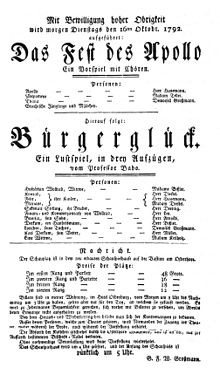Joseph Marius of Babo

Joseph Marius Franz von Babo (born January 14, 1756 in Ehrenbreitstein , † February 5, 1822 in Munich ) was a German writer .
Life
Babo was the son of the Electorate of Trier Johann Carl Babo and his wife Maria Anna Sittmann. After attending school, Babo studied aesthetics at the Jesuit college in Koblenz .
After his successful graduation in 1774, at the age of 18, he got a job as a secret secretary at the city theater in Mannheim . From 1778 to 1789 he was director of the electoral theater company. In 1781 he settled in Munich , where he was director of the National Theater from March 13, 1792 to September 11, 1810.
In 1784 Babo accused the Bavarian Illuminati Order around Adam Weishaupt in his writing Ueber Freymaurer of wanting to commit a conspiracy against the state, and thus gave one of the first reasons for the official ban and the self-dissolution of the order as well as the persecution of its members.
In 1789 he was appointed director of studies at the Munich Military Academy and held this office until 1799. In 1792 Babo was appointed theater commissioner and seven years later he was promoted to the electoral book censorship council. In 1807 he was elected a full member of the philological-philosophical class of the Bavarian Academy of Sciences .
Babo wrote knight dramas in the succession of Götz von Berlichingen by Johann Wolfgang von Goethe . He celebrated his greatest success with the drama Otto von Wittelsbach .
His visually powerful and theatrical pieces have seen numerous performances. His comedies, which thematize the contrast between staid bourgeoisie and aristocratic nobility, enjoyed great popularity among his contemporaries.
Joseph Marius Franz von Babo died on February 5, 1822 in Munich at the age of 66.
One of his father's cousins was the ennobled court official Johann Lambert von Babo (1725–1799), who was in charge of the Mannheim theater for a time. According to Neuer Deutscher Biographie , Joseph Marius von Babo described himself as his cousin.
Works

- Arno. A military drama in two acts. Frankfurt and Leipzig 1776. ( digitized version )
- The pleasure camp. A play in a plot. at Logenmeister, Vienna 1778 (presumed author). ( Digitized version)
- The winter quarters in America. A show in one go. at the Lodge Master, Vienna 1778. ( digitized version )
- The King of Franks Dagobert. A tragedy in five acts. Munich 1792. ( digitized ) English edition: Dagobert, King of the Franks , 1800
- Armida and Rinaldo. A melodrama based on Tasso frey mixed with choirs and dances in four acts. Wallishauser, Vienna 1793. ( digitized version )
- The Romans in Germany. A dramatic heroic poem in five acts. Gegel, Frankenthal 1780. ( digitized version )
- Otto von Wittelsbach. A tragedy in five acts. Hoffmann, Stuttgart 1869. ( digitized version )
- The painters. A comedy. Strodl, Munich 1783. ( digitized version )
- The Miss well-behaved. A comedy in three acts. A moral painting from Munich. Strobl, Munich 1783. ( digitized version )
- About freemasons. First warning. Hartl, Munich 1784. ( digitized version )
- Necessary supplement to the writing: About the Freemasons "First Warning" , 1783.
- Paintings from people's lives. Strobl, Munich 1784. ( digitized version )
- Complete diary of the strangest events and revolutions in Paris. 1789. (From the French) ( digitized version )
- The Strelitzen , 1790
- Citizen happiness. Comedy in the lifts. Wallishauser, Vienna 1792 ( digitized version )
- Instructions for celestial studies in easy-to-understand astronomical conversations , 1793 ( digitized version )
- Spectacles. Voss, Berlin 1793. ( digitized version )
- New plays. Unger, Berlin 1804. ( digitized version )
- The pulse. A comedy in two parts. 1805. ( digitized version )
- Albrecht's revenge for Agnes. A historical spectacle in four acts. Continuation of Agnes Bernauer. Wallishausser, Vienna 1808. ( digitized version )
literature
- Peter Höyng: The stars, the censorship and the fatherland. History and theater in the late 18th century . Cologne u. a. 2003.
- Joseph Kürschner : Babo, Joseph Marius Freiherr von . In: Allgemeine Deutsche Biographie (ADB). Volume 1, Duncker & Humblot, Leipzig 1875, p. 726 f.
- Carl Niessen : Babo, Joseph Marius von. In: New German Biography (NDB). Volume 1, Duncker & Humblot, Berlin 1953, ISBN 3-428-00182-6 , p. 481 ( digitized version ).
- Ludwig Pfeuffer: Joseph Marius Babo as director of the Munich National Theater 1799–1810 . Phil. Diss. Univ. Munich 1913.
- Wilhelm Trappl: Joseph Marius Babo (1756-1822). His literary work and his position in time. Phil. Diss. Univ. Vienna 1970.
- Silvia Wimmer: The Bavarian patriotic historical dramas. A contribution to the history of literature, censorship and political consciousness under Elector Karl Theodor . Munich 1999.
- Jürgen Wurst: Joseph Marius Babo . In: Wurst, Jürgen and Langheiter, Alexander (Ed.): Monachia. Munich: Städtische Galerie im Lenbachhaus, 2005. P. 163. ISBN 3-88645-156-9
Web links
- Literature by and about Joseph Marius von Babo in the catalog of the German National Library
- Works by and about Joseph Marius von Babo in the German Digital Library
- Joseph Marius von Babo in the Bavarian literature portal (project of the Bavarian State Library )
Individual evidence
| personal data | |
|---|---|
| SURNAME | Babo, Joseph Marius from |
| ALTERNATIVE NAMES | Babo, Joseph Marius Franz von (full name) |
| BRIEF DESCRIPTION | German writer |
| DATE OF BIRTH | January 14, 1756 |
| PLACE OF BIRTH | Ehrenbreitstein |
| DATE OF DEATH | February 5, 1822 |
| Place of death | Munich |